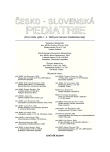-
Medical journals
- Career
Problems in Early Establishment of the Diagnosis of Severe Combined Immunodeficiency
Authors: R. Formánková 1; J. Bartůňková 2; A. Šedivá 2; O. Hrušák 1; E. Mejstříková 1; P. Sedláček 1; L. Šrámková 1; P. Keslová 1; V. Vávra 1; A. Janda 2; J. Litzman 4; E. Pařízková 5; K. Dlask 3; J. Starý 1
Authors‘ workplace: Klinika dětské hematologie a onkologie, UK 2. LF a FN Motol, Praha přednosta prof. MUDr. J. Starý, DrSc. 1; Ústav imunologie, UK 2. LF a FN Motol, Praha přednostka prof. MUDr. J. Bartůňková, DrSc. 2; Klinika anesteziologie a resuscitace, UK 2. LF a FN Motol, Praha přednosta prof. MUDr. K. Cvachovec, CSc. 3; Ústav klinické imunologie a alergologie LF MU a FN u Sv. Anny, Brno přednosta prof. MUDr. J. Litzman, CSc. 4; Dětská klinika LF UK a FN, Hradec Králové přednostka doc. MUDr. E. Pařízková, CSc. 5
Published in: Čes-slov Pediat 2007; 62 (1): 5-15.
Category: Original Papers
Overview
Severe combined immunodeficiency (SCID) is a heterogeneous group of rare genetic disorders caused by a number of different gene mutations and characterized by impaired humoral and cellular immunity. Affected infants usually present in the first months of life with atypical or recurrent infections. If left untreated they mostly die by the end of the first year of life. SCID is a rare disorder and that is why a high degree of suspicion is necessary to enable early recognition and diagnosis. A complex immunological investigation should be always indicated in children with recurrent skin and mucosal infections, respiratory and gastrointestinal infections and failure to thrive, mainly in combination with persistent lymphopenia. Hematopoietic stem cell transplantation (SCT) is the current treatment of choice for most of the forms of SCID.
Immunoglobulin substitution and treatment with wide-spectrum antibiotics, antimycotics, antituberculotics and antivirotics must be commenced once a diagnosis of SCID is made. Only irradiated blood products can be administered to these children. Relevant issues related to early recognition and diagnosis are demonstrated through nine case reports of patients with severe combined immunodeficiency diagnosed and indicated for SCT in the Czech Republic in 1995-2004. Hematopoietic stem cell transplantation is the most effective treatment in patients with SCID and early diagnosis and urgent referral to a specialized center is crucial for successful outcome of SCT.Key words:
severe combined immunodeficiency, primary immunodeficiency, infection, stem cell transplantation
Labels
Neonatology Paediatrics General practitioner for children and adolescents
Article was published inCzech-Slovak Pediatrics

2007 Issue 1-
All articles in this issue
- Problems in Early Establishment of the Diagnosis of Severe Combined Immunodeficiency
- Mycoplasmal Pneumonia in Childhood
- Child Abuse and Neglect Syndrome (sy CAN) in Our Society and Medical Staff
- Stevens–Johnson Syndrome and Toxic Epidermal Necrolysis in Children
- Hypoplastic Left Heart Syndrome – cui bono? Review article
- Differential Diagnostics of Swelling at the Child Age
- Subtelomeric Rearrangement as a Cause of Microcephaly, Facial Dysmorphia and Mental Retardation
- Czech-Slovak Pediatrics
- Journal archive
- Current issue
- Online only
- About the journal
Most read in this issue- Mycoplasmal Pneumonia in Childhood
- Stevens–Johnson Syndrome and Toxic Epidermal Necrolysis in Children
- Subtelomeric Rearrangement as a Cause of Microcephaly, Facial Dysmorphia and Mental Retardation
- Child Abuse and Neglect Syndrome (sy CAN) in Our Society and Medical Staff
Login#ADS_BOTTOM_SCRIPTS#Forgotten passwordEnter the email address that you registered with. We will send you instructions on how to set a new password.
- Career

